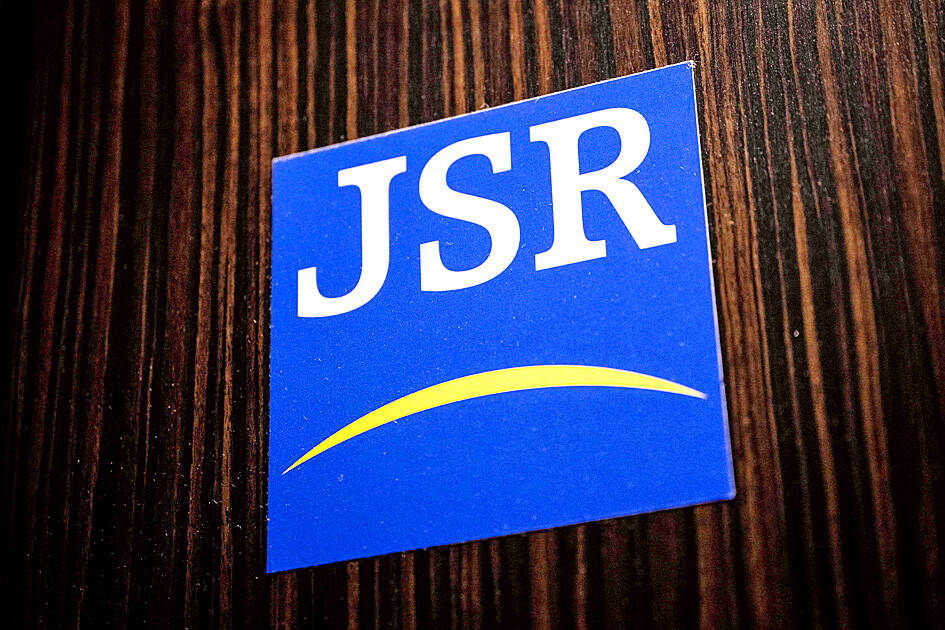The Japanese government unveiled a US$6.3 billion deal to buy out and privatize JSR Corp, taking control of the world leader in chipmaking compounds at a time US-China tensions threaten to fragment the US$550 billion global semiconductor industry.
Government-backed Japan Investment Corp plans to offer shareholders ¥4,350 per share in a tender offer in December, the company said yesterday in a statement.
That works out to as much as ¥903.9 billion (US$6.3 billion), JSR said.

Photo: AFP
The move could facilitate Tokyo’s control over compounds essential for making advanced semiconductors.
Founded in 1957, JSR is the world’s leading maker of photoresists and one of three Japanese companies, along with Shin-Etsu Chemical Co and Tokyo Ohka Kogyo Co, that control the global supply of fluorinated polyimide and hydrogen fluoride.
Those compounds are needed to make semiconductors used in supercomputers, artificial intelligence-harnessing data centers and missile control systems, as well as gadgets including Apple Inc iPhones.
Government control over the materials critical to powerful chips would grant Japan greater leverage in a world increasingly divided by an escalating US-China technological rift.
An unlisted JSR backed with public funds could also take more long-term risks to expand market share.
JSR shares surged 22 percent yesterday after Japan’s Nikkei Shimbun reported on the deal, the most since 1999.
JSR peer Shin-Etsu jumped 1.5 percent and Tokyo Ohka Kogyo surged 9.1 percent to a record high.
“The point is to make the most of this position of strength. So the government is continuing these strategic investments,” University of Tokyo Graduate School of Public Policy professor Kazuto Suzuki said.
“If the government takes it over, it won’t be exposed to the risk of a buyout from overseas. So it becomes a national policy company,” Suzuki said.
Japanese Prime Minister Fumio Kishida’s administration is betting shifting geopolitical priorities would help Japan regain some of its long-lost leadership in semiconductors.
Japan is preparing billions of US dollars in subsidies as part of a push to triple domestic production of chips by 2030.
Growing tech protectionism is spurring policymakers globally to go upstream in the supply chain to find more chokeholds to control technologies.
In October last year, the US spearheaded a push to limit China’s access to advanced semiconductors, and its allies have since stepped up efforts to curb exports on equipment and technology.
Germany has discussed limiting the export of chip chemicals to China. Such a move would restrict sales of materials by companies such as Merck KGaA and BASF SE, slowing China’s innovation.
Japan, which seeks to raise its profile as a chip supplier, still commands leading market share in some little-known, but essential parts of the chip supply chain — a legacy from when Japan led the world in semiconductor technology in the 1980s.
Tokyo tightened control over exports of chip chemicals in 2019, roiling South Korea’s biggest companies and prompting Seoul to file a complaint to the WTO.
The restrictions did little to affect shipments of the materials to chipmakers Samsung Electronics Co and SK Hynix Inc, but the move was seen as a threat to hurt Seoul economically.
“The semiconductor materials business is becoming increasingly important as a matter of national policy,” SMBC Nikko Securities Inc analyst Go Miyamoto wrote in a note.
Valuations for other semiconductor materials stocks would likely increase “if investors start to price in similar possible acquisitions,” Miyamoto wrote.

Micron Memory Taiwan Co (台灣美光), a subsidiary of US memorychip maker Micron Technology Inc, has been granted a NT$4.7 billion (US$149.5 million) subsidy under the Ministry of Economic Affairs A+ Corporate Innovation and R&D Enhancement program, the ministry said yesterday. The US memorychip maker’s program aims to back the development of high-performance and high-bandwidth memory chips with a total budget of NT$11.75 billion, the ministry said. Aside from the government funding, Micron is to inject the remaining investment of NT$7.06 billion as the company applied to participate the government’s Global Innovation Partnership Program to deepen technology cooperation, a ministry official told the

Taiwan Semiconductor Manufacturing Co (TSMC, 台積電), the world’s leading advanced chipmaker, officially began volume production of its 2-nanometer chips in the fourth quarter of this year, according to a recent update on the company’s Web site. The low-key announcement confirms that TSMC, the go-to chipmaker for artificial intelligence (AI) hardware providers Nvidia Corp and iPhone maker Apple Inc, met its original roadmap for the next-generation technology. Production is currently centered at Fab 22 in Kaohsiung, utilizing the company’s first-generation nanosheet transistor technology. The new architecture achieves “full-node strides in performance and power consumption,” TSMC said. The company described the 2nm process as

POTENTIAL demand: Tesla’s chance of reclaiming its leadership in EVs seems uncertain, but breakthrough in full self-driving could help boost sales, an analyst said Chinese auto giant BYD Co (比亞迪) is poised to surpass Tesla Inc as the world’s biggest electric vehicle (EV) company in annual sales. The two groups are expected to soon publish their final figures for this year, and based on sales data so far this year, there is almost no chance the US company led by CEO Elon Musk would retain its leadership position. As of the end of last month, BYD, which also produces hybrid vehicles, had sold 2.07 million EVs. Tesla, for its part, had sold 1.22 million by the end of September. Tesla’s September figures included a one-time boost in

Shares in Taiwan closed at a new high yesterday, the first trading day of the new year, as contract chipmaker Taiwan Semiconductor Manufacturing Co (TSMC, 台積電) continued to break records amid an artificial intelligence (AI) boom, dealers said. The TAIEX closed up 386.21 points, or 1.33 percent, at 29,349.81, with turnover totaling NT$648.844 billion (US$20.65 billion). “Judging from a stronger Taiwan dollar against the US dollar, I think foreign institutional investors returned from the holidays and brought funds into the local market,” Concord Securities Co (康和證券) analyst Kerry Huang (黃志祺) said. “Foreign investors just rebuilt their positions with TSMC as their top target,